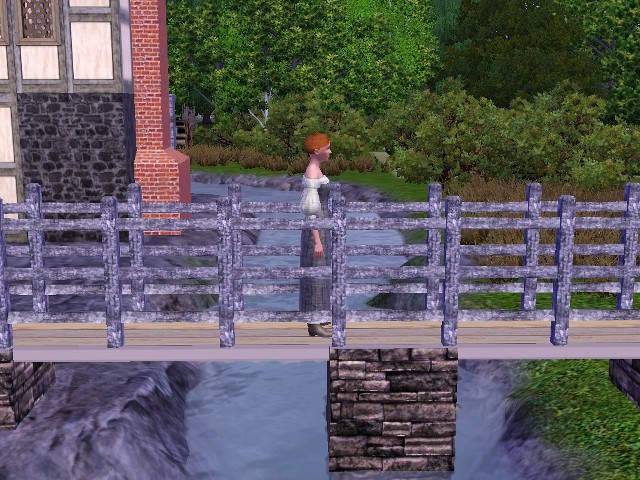 “Talisman Malherbe? Where are you?” A whiny, moaning voice was calling in the background, but my desire to see the changes that had happened was so great that it pushed this Talisman away from the voice and onto the rickety bridge crossing the moat.
“Talisman Malherbe? Where are you?” A whiny, moaning voice was calling in the background, but my desire to see the changes that had happened was so great that it pushed this Talisman away from the voice and onto the rickety bridge crossing the moat.The house had a timber-framed extension built on to the front of it. And I knew who’d done that – this Talisman’s grandfather. And he’d spent a lot of money on it too. But the grounds – the once-productive grounds – they were an overgrown jungle. And this Talisman was a mystery to me as well – she seemed such a negative character.
I had to know more. I pushed her up on to the roof of the house.
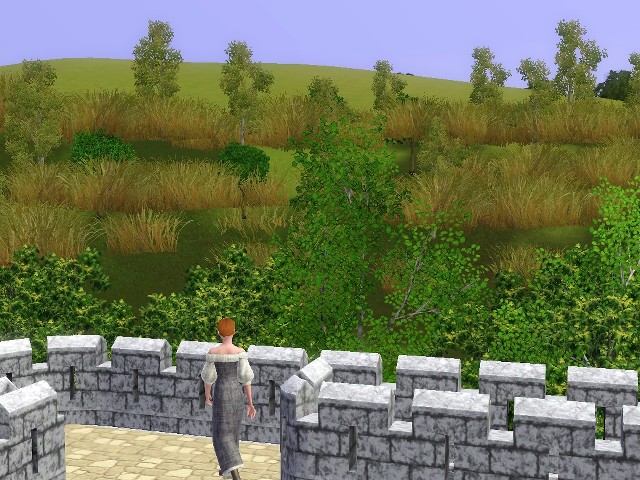 I looked out to the back of the house first. Below me, I should have seen the stables – but there was no sign of them now. No horses? Then how did they manage with no horses? And where there had once been thick woodland, oak, ash and elm, I saw birch trees and scrubby, brambly grass. Where had all the trees gone? But Talisman’s mind provided me with the answer, even as I thought about it. Ship building, of course: first King Henry’s navy and now his daughter Elizabeth’s. The ships that had saved us when the Spanish Armada had threatened our England. A brief flicker of pride warmed Talisman’s heart and then died down again.
I looked out to the back of the house first. Below me, I should have seen the stables – but there was no sign of them now. No horses? Then how did they manage with no horses? And where there had once been thick woodland, oak, ash and elm, I saw birch trees and scrubby, brambly grass. Where had all the trees gone? But Talisman’s mind provided me with the answer, even as I thought about it. Ship building, of course: first King Henry’s navy and now his daughter Elizabeth’s. The ships that had saved us when the Spanish Armada had threatened our England. A brief flicker of pride warmed Talisman’s heart and then died down again.
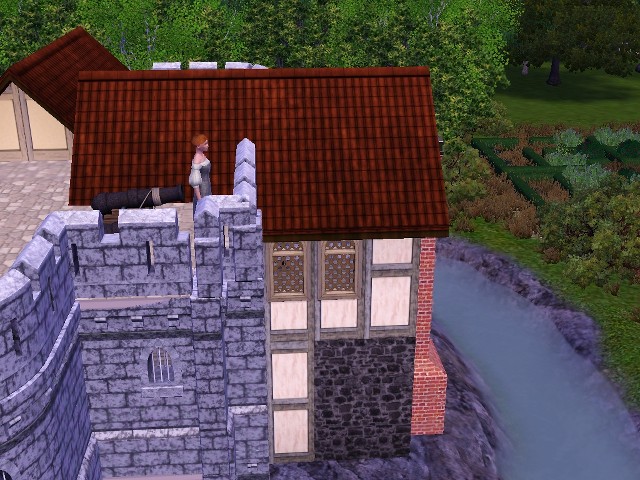 Cannon! There were cannon on the roof! Were they expecting to defend the house against enemies then? The place looked no better from this side. A seriously overgrown knot-garden, and weeds, brambles and general mess everywhere. And Talisman was so – so hopeless, so defeated.
Cannon! There were cannon on the roof! Were they expecting to defend the house against enemies then? The place looked no better from this side. A seriously overgrown knot-garden, and weeds, brambles and general mess everywhere. And Talisman was so – so hopeless, so defeated.She was older than me – twenty years old – and she didn’t seem to have any of the guts or determination that the other Talismans had had. Even the 1929 Talisman had been able to pull herself together and stand up to Miss Aislaby in the end. This one was just – well, wet and dejected.
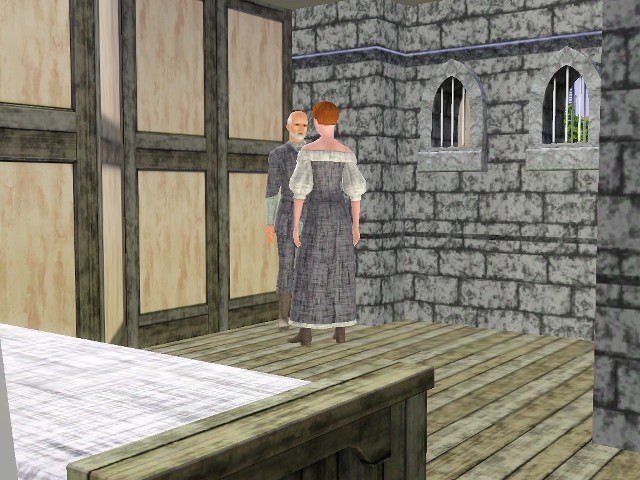 The room that had once been the chapel was now larger – and was Talisman’s bedroom. And bed-room was all that it was. The only piece of furniture in it was the bed. And Talisman’s father looked so old! And so worried all the time. It was money; it was always about money. And yet I couldn’t work out why they should be so poor. They owned the lands around the house now instead of holding them from their overlord. There had been four and a half centuries of change. But this Sir Matthew Malherbe shouldn’t be as poor as this. Ship House stood in the middle of good farmland. The rents from the farms should be easily enough to let them live comfortably.
The room that had once been the chapel was now larger – and was Talisman’s bedroom. And bed-room was all that it was. The only piece of furniture in it was the bed. And Talisman’s father looked so old! And so worried all the time. It was money; it was always about money. And yet I couldn’t work out why they should be so poor. They owned the lands around the house now instead of holding them from their overlord. There had been four and a half centuries of change. But this Sir Matthew Malherbe shouldn’t be as poor as this. Ship House stood in the middle of good farmland. The rents from the farms should be easily enough to let them live comfortably.
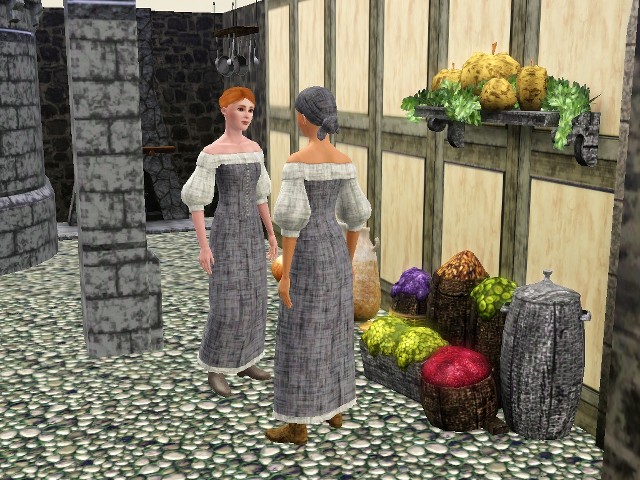 I found Talisman’s mother, Damaris, in the kitchen, still complaining fretfully. And as I looked round the room, all that I had learnt from Anna de Malherbe told me that there was not enough food here. I’d already looked downstairs in the cellars (still no sign of a door through to where Ship was), and instead of the rows and rows of barrels full of ale and wine and salted meats and fish, there were just a couple of barrels of salt pork. This family was going to starve to death come the winter if they didn’t get their act together right now! I hadn’t realised how much I’d learnt from my time as Talisman de Malherbe.
I found Talisman’s mother, Damaris, in the kitchen, still complaining fretfully. And as I looked round the room, all that I had learnt from Anna de Malherbe told me that there was not enough food here. I’d already looked downstairs in the cellars (still no sign of a door through to where Ship was), and instead of the rows and rows of barrels full of ale and wine and salted meats and fish, there were just a couple of barrels of salt pork. This family was going to starve to death come the winter if they didn’t get their act together right now! I hadn’t realised how much I’d learnt from my time as Talisman de Malherbe.
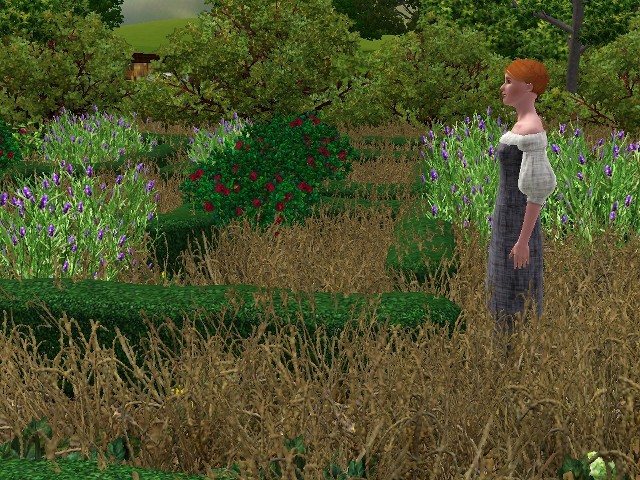 Up to now, I’d kept my own personality very much in the background, pushing at the Talisman of that time only when I really needed her to do something. It seemed a bit – well, intrusive – to try and take control: and besides, Talisman de Malherbe had been so much more competent at her way of life than I would ever have been. But this Talisman Malherbe needed a boot up her backside! She was drifting around, lost in misery, and making no attempt to change anything. And her parents were no better. I couldn’t help contrasting them with Harry and Sapphire, both of whom would have rolled up their sleeves and started doing something. I drove Talisman outside to check out the knot garden and see if there was anything to salvage there.
Up to now, I’d kept my own personality very much in the background, pushing at the Talisman of that time only when I really needed her to do something. It seemed a bit – well, intrusive – to try and take control: and besides, Talisman de Malherbe had been so much more competent at her way of life than I would ever have been. But this Talisman Malherbe needed a boot up her backside! She was drifting around, lost in misery, and making no attempt to change anything. And her parents were no better. I couldn’t help contrasting them with Harry and Sapphire, both of whom would have rolled up their sleeves and started doing something. I drove Talisman outside to check out the knot garden and see if there was anything to salvage there.
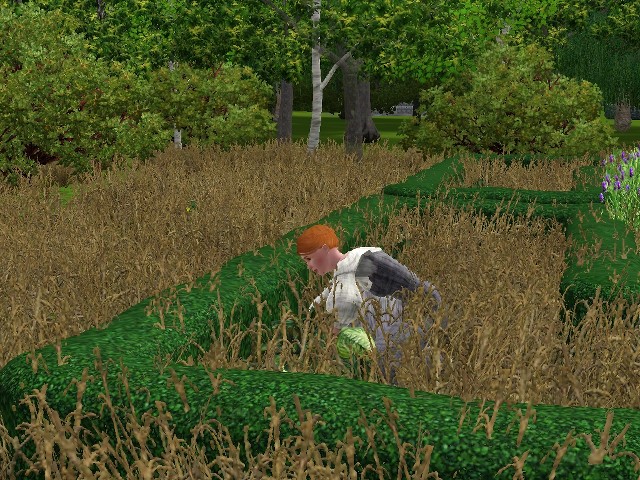 There was stuff in that knot garden! There were the herbs that Anna de Malherbe had used so well, and there was food! Going to waste! What were they playing at? Never mind the guerdon – whoever had it would probably show up at some point, like they had before – let’s get something done here before we all starved to death. And I didn’t know what would happen to me if the Talisman I was inside died while I was there. And I didn’t know how long I was going to be here either. Best to take no chances. This Talisman went to find some tools so that she could get weeding.
There was stuff in that knot garden! There were the herbs that Anna de Malherbe had used so well, and there was food! Going to waste! What were they playing at? Never mind the guerdon – whoever had it would probably show up at some point, like they had before – let’s get something done here before we all starved to death. And I didn’t know what would happen to me if the Talisman I was inside died while I was there. And I didn’t know how long I was going to be here either. Best to take no chances. This Talisman went to find some tools so that she could get weeding.
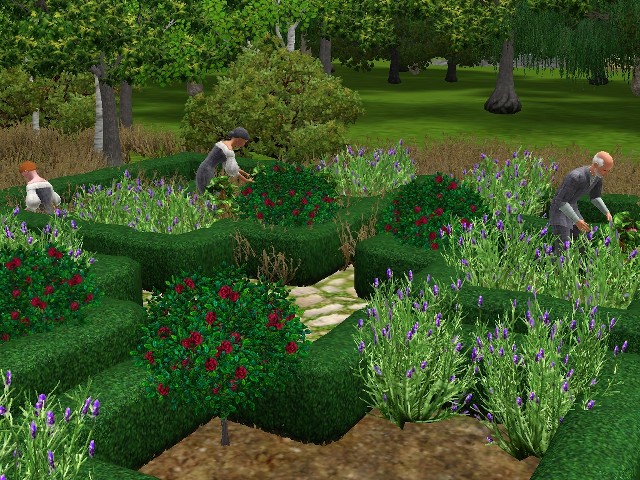 I got her to put a bit of backbone into her parents as well.
I got her to put a bit of backbone into her parents as well.“I’faith, mother, it serves no purpose to say ‘Oh if Hal were but home again.’ He’s gone, and we must shift to do our best without him.” And she pushed her parents into working in the garden too.
It was a dawn-til-dusk race against time , to beat the growing season, to rescue and split enough plants so that we had a faint hope of getting through the winter.
Hal was Talisman’s older brother, and he had left home several years before, refusing to stay and watch things decay around him. They had had a couple of messages, sent via a travelling pedlar. The second had said that he was signing on as third mate on a ship bound for the Indies – and after that one, they had heard nothing.
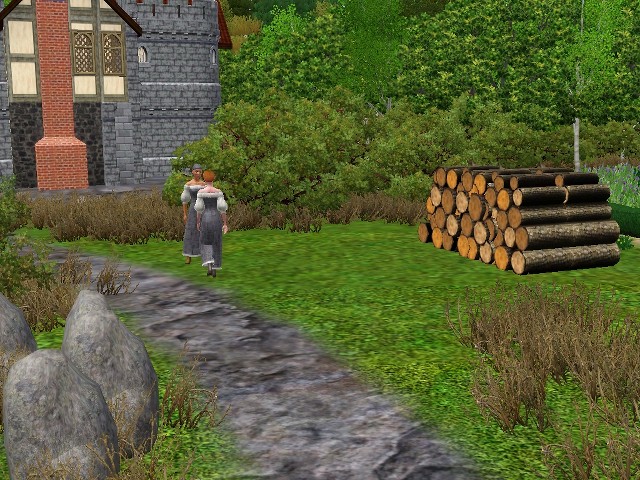 The brambles were cleared, trees were cut down, and a large stack of firewood began to appear. At least they weren’t going to freeze to death come the winter. Oddly enough, the more time they spent outside, the more cheerful the Malherbes became. I had to admit, inside was pretty grim and depressing. And yet it hadn’t seemed so in Anna de Malherbe’s day – it had been clean and sweet-smelling thanks to the herbs she strewed around the place.
The brambles were cleared, trees were cut down, and a large stack of firewood began to appear. At least they weren’t going to freeze to death come the winter. Oddly enough, the more time they spent outside, the more cheerful the Malherbes became. I had to admit, inside was pretty grim and depressing. And yet it hadn’t seemed so in Anna de Malherbe’s day – it had been clean and sweet-smelling thanks to the herbs she strewed around the place.
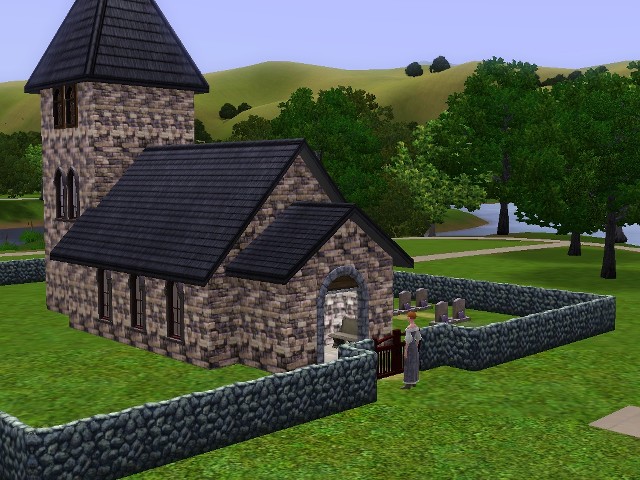 One thing that had been worrying me – and yet not this Talisman, or her parents – was how the villagers were doing. Anna and Pierre de Malherbe had always been concerned for the well-being of their villeins and serfs. They were their responsibility; the de Malherbes were supposed to look after the people who worked for them. I decided to go down into the village and find out for myself. And I wanted to see what had changed there as well.
One thing that had been worrying me – and yet not this Talisman, or her parents – was how the villagers were doing. Anna and Pierre de Malherbe had always been concerned for the well-being of their villeins and serfs. They were their responsibility; the de Malherbes were supposed to look after the people who worked for them. I decided to go down into the village and find out for myself. And I wanted to see what had changed there as well.The church was bigger! The tower was taller, and there were bells in the upper part of it. And a porch on the front as well. But there was no sign that Mathilde’s little cottage had ever been there.
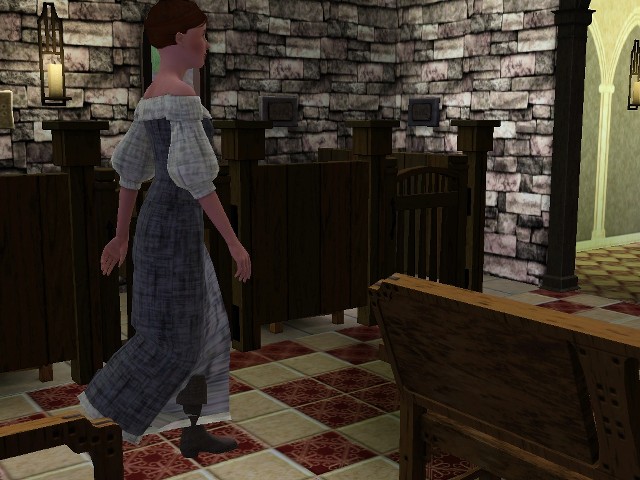 Talisman went inside, and that was totally changed too! There were pews – some of them boxed in, with little doors to let you in or out, and some of them just plain. The little Norman church I remembered had been empty of seats – people used to bring a folding stool if they wanted to sit down. There was a new chapel on the side of it – but this new chapel was old in Talisman’s reckoning. It was really odd, moving on in time like this.
Talisman went inside, and that was totally changed too! There were pews – some of them boxed in, with little doors to let you in or out, and some of them just plain. The little Norman church I remembered had been empty of seats – people used to bring a folding stool if they wanted to sit down. There was a new chapel on the side of it – but this new chapel was old in Talisman’s reckoning. It was really odd, moving on in time like this.
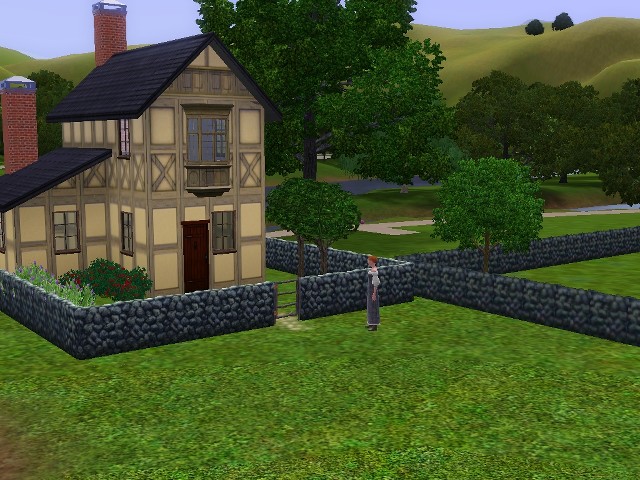 The priest’s house was still in the same place, but the modest little house I remembered had been replaced by a much larger one. The oak of the timbers was still golden with newness.
The priest’s house was still in the same place, but the modest little house I remembered had been replaced by a much larger one. The oak of the timbers was still golden with newness.
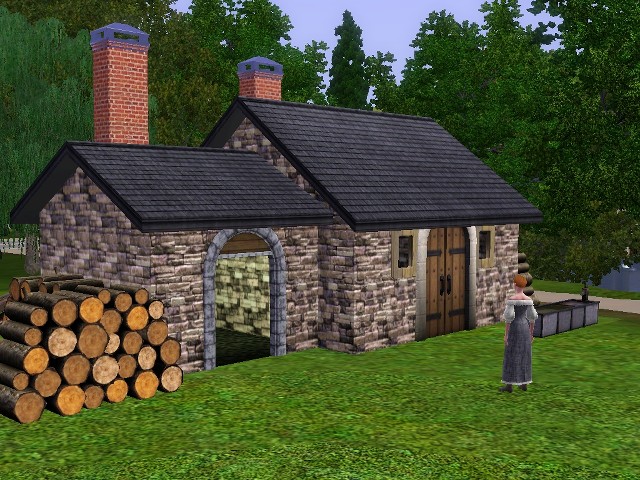 The forge was larger too – the smith obviously didn’t live there any more, for both halves of the building were being used as a workshop, instead of just the smaller half. So maybe things weren’t too bad for the Malherbe villagers. But I still couldn’t understand why Talisman and her parents were so can’t-be-bothered about everything.
The forge was larger too – the smith obviously didn’t live there any more, for both halves of the building were being used as a workshop, instead of just the smaller half. So maybe things weren’t too bad for the Malherbe villagers. But I still couldn’t understand why Talisman and her parents were so can’t-be-bothered about everything.
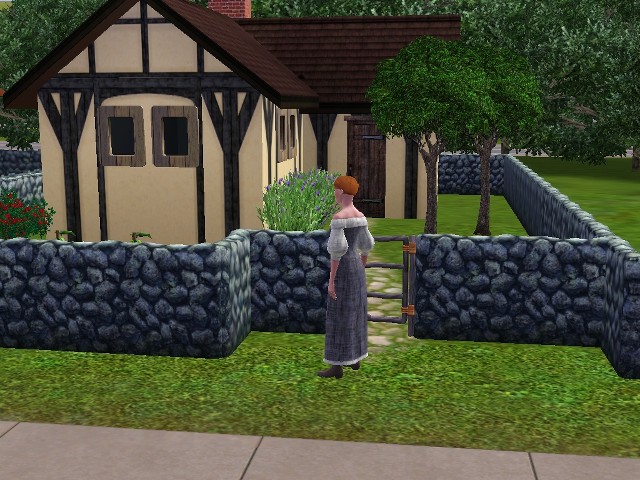 The first cottage I came to looked clean, sound and prosperous. The garden was well-stocked with plants and herbs.
The first cottage I came to looked clean, sound and prosperous. The garden was well-stocked with plants and herbs.
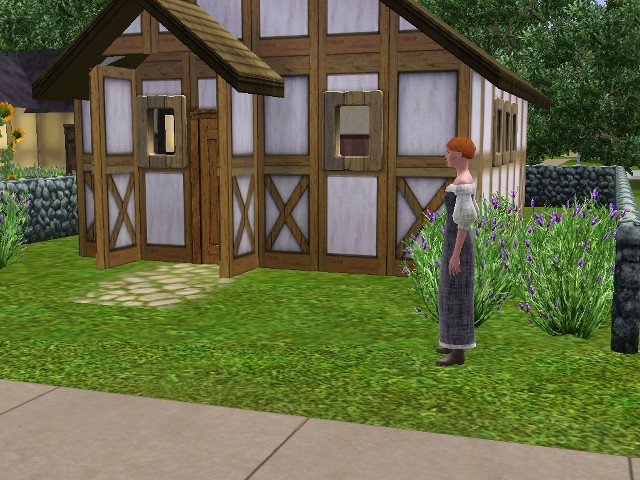 And this one looked fine too. I was beginning to wonder if the village was making itself rich at the expense of Sir Matthew – but that didn’t make sense. He was the one with the power. The farmers here were his tenant farmers. So where were the rents going?
And this one looked fine too. I was beginning to wonder if the village was making itself rich at the expense of Sir Matthew – but that didn’t make sense. He was the one with the power. The farmers here were his tenant farmers. So where were the rents going?
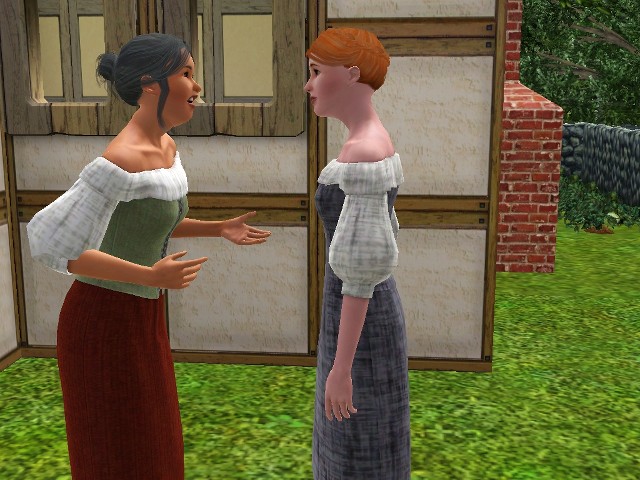 At the next cottage, someone came bustling out to greet me. And Talisman knew her – Miller. Mistress Hannah Miller, that’s who this was.
At the next cottage, someone came bustling out to greet me. And Talisman knew her – Miller. Mistress Hannah Miller, that’s who this was.“Oh, Mistress Talisman, it do be good to see a Malherbe here in the village again. There do be so many things as need Sir Matthew’s attention.”
The stuff her clothes were made from was better than Talisman’s. What was wrong here?
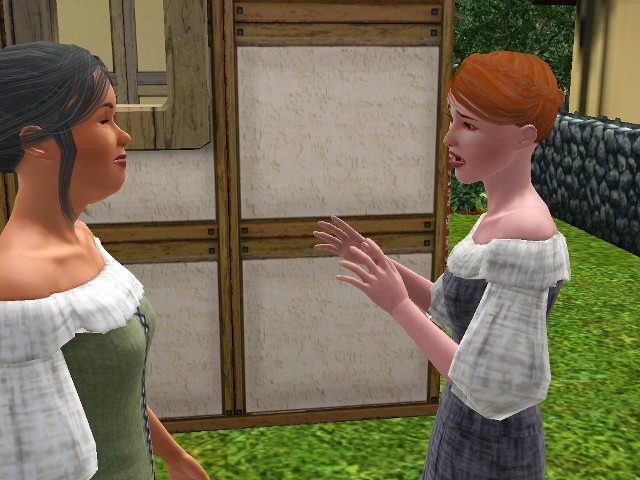 The words came out of Talisman’s mouth before she realised she was going to say them. And I made her stand still and listen to all that Mistress Miller had to say (which was quite a lot: she was obviously a talkative woman).
The words came out of Talisman’s mouth before she realised she was going to say them. And I made her stand still and listen to all that Mistress Miller had to say (which was quite a lot: she was obviously a talkative woman).
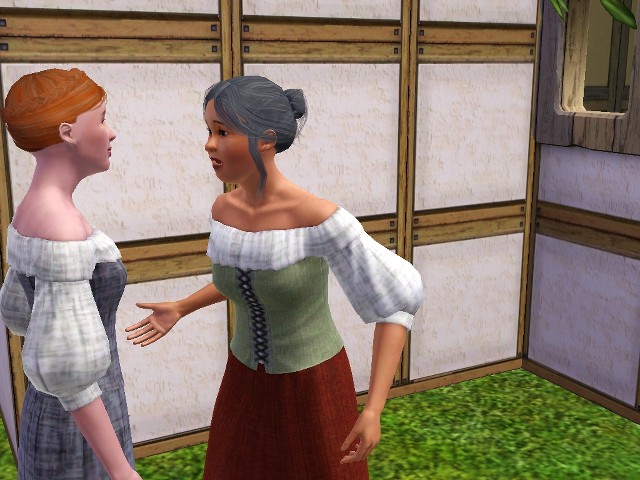 It had all started to go wrong in Talisman’s grandfather’s day, it seemed. To start with, he had been fiercely opposed to the loss of the Catholic church. He had paid fine after fine for recusancy, and it had been suspected that he hid priests in his house and heard mass in secret there. That explained some of the money troubles they had now, but not all of them.
It had all started to go wrong in Talisman’s grandfather’s day, it seemed. To start with, he had been fiercely opposed to the loss of the Catholic church. He had paid fine after fine for recusancy, and it had been suspected that he hid priests in his house and heard mass in secret there. That explained some of the money troubles they had now, but not all of them.Then he had changed in personality, become grumpy and intolerant, and driven his sons from the house. Talisman’s father had found a job in a near-by city, and worked there until the old man had died. Then he had come home with his wife, and two children, and for a while all had seemed well.
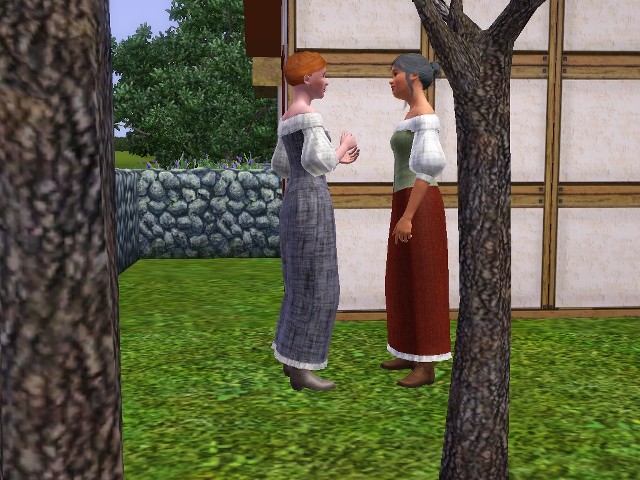 “Then what happened?” Talisman asked. This was new to her as well.
“Then what happened?” Talisman asked. This was new to her as well.Sir Matthew had just stopped caring about anything. And so had Damaris as well. They weren’t bothering to collect the rents, they weren’t repairing the cottages – in the end, the villagers had to repair their cottages themselves. But what was worrying them was what if Sir Matthew suddenly decided to collect all the back rents at once? The villagers had put some of them aside – but some they’d put into better stock, a new plough. It just wasn’t possible to go on farming without investing in the place.
“They do say as a curse were put on the Malherbes. And they do say as old Goodie Fletcher were the one as did it, and only she can lift it. But ‘twould be a brave person as went and asked her what she knew.”
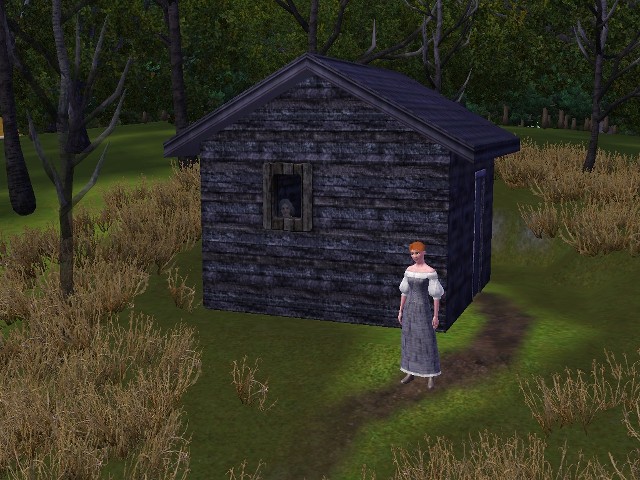 Talisman Malherbe would not have described herself as a brave person. But she didn’t have a lot of choice. This Goodie Fletcher sounded like the most likely person to have the guerdon, and I needed to find it. The forest round her house was dark and deep though, and even I was a bit un-nerved by it. The sight of old Goodie Fletcher’s hut didn’t help either.
Talisman Malherbe would not have described herself as a brave person. But she didn’t have a lot of choice. This Goodie Fletcher sounded like the most likely person to have the guerdon, and I needed to find it. The forest round her house was dark and deep though, and even I was a bit un-nerved by it. The sight of old Goodie Fletcher’s hut didn’t help either.
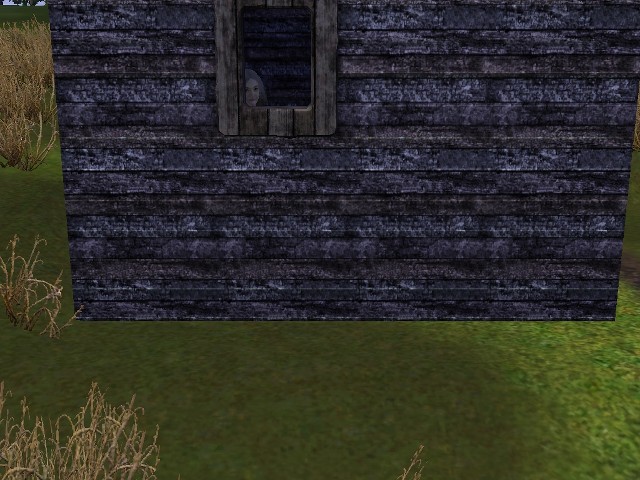 And neither did the face at the window. It didn’t look very welcoming.
And neither did the face at the window. It didn’t look very welcoming.
No comments:
Post a Comment